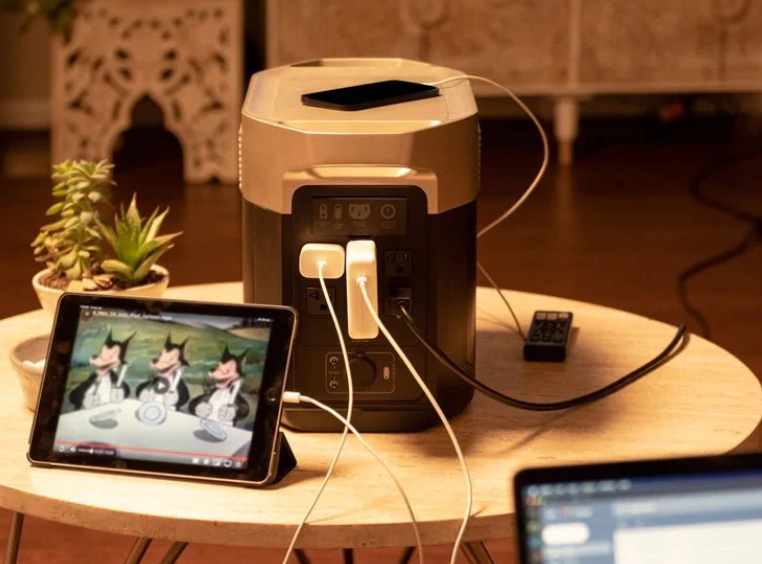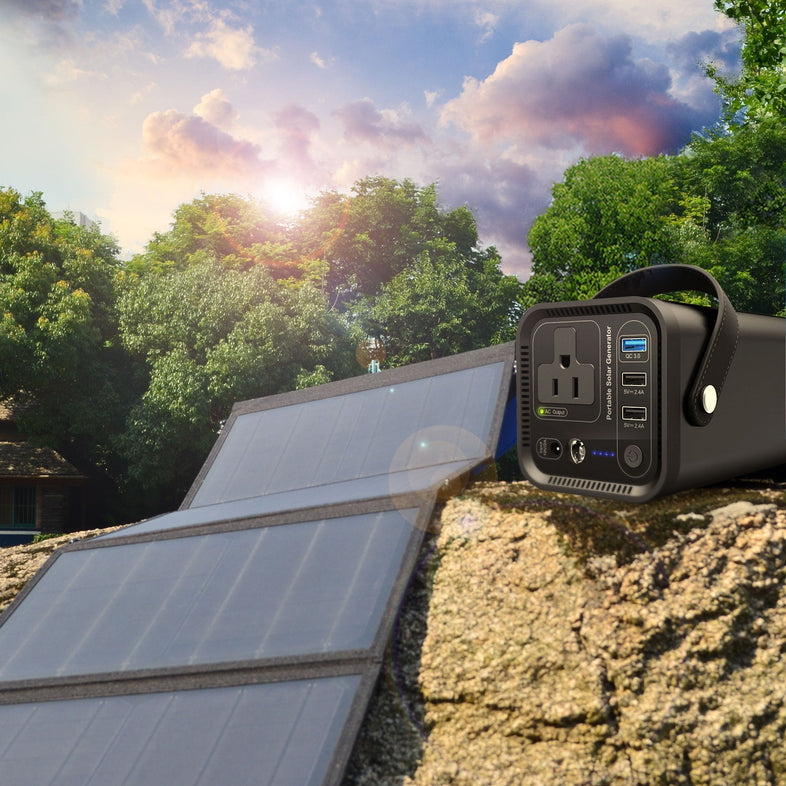
Best Generator for (Off The Grid) Overlanding
Picking a solid generator is vital if you're gearing up for an overland adventure. It's the heart of your camp's power, allowing you to keep your electronics charged, your food cold, and your nights bright.
Let me guide you through the best generators that pack durability and portability for your off-grid needs.
These top picks shine in ruggedness and are easy to carry, ensuring they're up for any challenge your journey throws them. They're not just generators but your dependable travel companions, ready to energize all your overlanding escapades.
Choosing the Right Generator for Overlanding
If you're gearing up for overlanding, picking the right generator matters. Below are the things to consider when choosing the right generator for overlanding.
What factors to consider when selecting an overland generator
Choosing a generator for overlanding requires considering its durability and portability. It should be tough enough for wild places but not too heavy. Additionally, it should be fuel-efficient for longer trips.
A good generator provides the necessary power without being burdensome. Reliability is crucial when traveling far from home. Therefore, look for a generator that is durable, easy to transport, fuel-efficient, and effective off the grid.
Following these tips, you can find a generator that suits your adventure-loving lifestyle and powers your devices.
Comparing power capacities for overland generators
Before you set off on an overland trip, figuring out how much power your gear needs is key. Start by adding up the wattage of your fridge, lights, chargers, and radios.
You'll want a generator that can handle all of this at once. Go for one that's got a bit more juice than your total, so you're covered for extra power needs that might pop up.
Ensure it's not too big or heavy since you don't want moving around to be a hassle. By picking a generator with just the right power capacity, you'll have a reliable energy source for your journey without it being a burden.
Gas vs. solar generators for Overlanding
When planning an off-road trip, consider the kind of generator you'll need.
Let's talk about gas and solar generators.
Gas generators are great because they're strong and work well in places without electricity. But they can be loud, need fuel, and dirty the air.
Solar generators, on the other hand, are quiet and don't harm the environment because they use sunlight to make power.
A gas generator might be better if you need a lot of energy. But if you care about nature and don't want to worry about buying fuel, a solar generator could be the way to go. It's also nice because, over time, you might save money since you're not buying gas.
So, when picking a generator for your adventures, think about what you need it for and how it affects the world around you. Gas generators are easy to find, but solar ones are better for the Earth and can be cheaper as time goes on.
Your final choice between a gas or solar generator will depend on what's important to you, your power needs, and whether you want to use cleaner energy.
Power Requirements for Overlanding: Calculating Power Needs
Before you hit the road for an Overlanding trip, figuring out how much power you'll need is critical.
How to determine the power requirements for overlanding?

To figure out how much power you'll need for overlanding, add the watts all your must-have electronics use. This includes your cooler, lights, map system, and phone chargers. The total watts tell you the smallest amount of power your generator needs to make.
When you're out exploring, relying on your power is super important. Go for generators built for use when there's no plug in sight. Think about how long your adventures will be and how many devices will need power simultaneously.
Tips for optimizing generator fuel efficiency during Overlanding
To get the most out of your generator's fuel while overlanding, start by figuring out how much power your gear needs. Add up the watts used by each item. Try using gadgets that don't need as much power to lighten your generator's load.
Turning off the gear when you're not using it and picking power-saving settings can save fuel, too. A good move is to pick a generator that has an eco-mode.
This mode changes how fast the engine runs to match just the power you need, which means less fuel is used.
Also, keep your generator in top shape. Clean the air filters and make sure the engine is well-tuned. This ensures your generator runs smoothly and doesn't waste fuel on your adventures.
Top-Rated Overland Generators: Reviews and Recommendations
Let's dive into some great overland generators that folks love for outdoor trips.
- The ACOPOWER 154Wh/160W is a portable solar generator that's getting attention for being super reliable and easy to carry.
- Then there's the EcoFlow Smart Generator, which can use two fuel types – that's handy! It's also got a buddy, the EcoFlow DELTA Pro, which is like the Smart Generator but with more power.
- And if you want to go all out, the EcoFlow DELTA Max pairs up with the Smart Generator for even more energy.
All these options are solid for when you're off the grid and need to power up your stuff. They're efficient, dependable, and won't weigh you down.
1. ACOPOWER 154Wh/160W Portable Solar Generator
The ACOPOWER Portable Solar Generator is small but mighty, fitting easily into your travel gear. It powers up your gadgets like phones, small coolers, and laptops using a 154Wh lithium-ion battery.
This generator runs quietly without gas, which is great for outdoor trips. It includes a smart tech called MPPT that ensures you get the most power from the sun.
Now, let's talk about what this generator brings to the table. It can store 154 watt-hours of power and has a long life, working well even after many charges. It's built to work well in temperatures from freezing to quite warm.
It's compact, about the size of a small book, and weighs less than a gallon of milk. For your devices, it has two USB ports and one quick-charge port. Plus, there's an outlet for larger things like a lamp or a small TV.
It's pretty awesome for its size, but it won't run big appliances. And remember, you need to get a solar panel separately. If you're using lots of devices at once, it mightn't be able to handle them all. But for a personal power source on the go, it's easy to use and can be trusted to keep you connected.
2. ACOPOWER 154Wh Generator

The ACOPOWER 154Wh Generator is your go-to for portable power. It's got a lithium-ion battery that stores 154 watt-hours of energy. That means you can charge your laptop phone or run a small cooler when you're far from home.
It's also friendly for CPAP machines so you can sleep easily on outdoor trips. This quiet generator doesn't need gas, so you can enjoy nature without noise or fumes.
Here's what's inside: The lithium-ion battery has 41600mAh capacity. You can charge it with solar panels or an adapter. The inverter gives you clean electricity, just like at home. The generator can be used many times (up to 1200 cycles until it reaches 80% of its original capacity).
It works well in temperatures from freezing to really hot (32-104℉). It's also pretty compact, about the size of a small book (9.1x3.5x3.5 inches), and light, weighing just under four pounds.
For charging your gadgets, it has two regular USB ports, a quick-charge USB port, and an AC outlet for bigger things. But remember, it can't power big appliances, and you might need more energy for long trips. Plus, you'll need sunlight to charge it up again with solar panels.
In a nutshell, the ACOPOWER 154Wh Generator is lightweight and easy to bring along. It uses clean energy, which is excellent for the planet. It's super versatile, so most of your small devices will work with it when you're enjoying the great outdoors. Remember, it's not made for bigger stuff or long adventures without a recharge.
3. EcoFlow Smart Generator (Dual Fuel)

The EcoFlow Smart Generator, with its dual fuel feature, stands out for those who love to explore the outdoors. It runs on both gasoline and LPG, giving you the choice of fuel that suits you best. This generator is great for overlanding trips, where you mightn't know what kind of fuel you'll find.
It has a large 20kWh capacity, so you can count on it for a long time. Plus, you can use an app to control and check on it from afar. This means you don't have to worry about power while having fun in nature.
Another cool thing is that it's really quiet. Even if you're 23 feet away, it only makes a noise as loud as a normal conversation, at 56dB, so it won't spoil the calm of the wilderness.
Taking care of this generator is simple, which is great when you're away from home. It's built to be easy to maintain, so you can spend more time enjoying your adventure and less time fussing with equipment.
However, there are a few things to keep in mind. If you have an EcoFlow DELTA Pro, you'll need an adapter to connect it to this Smart Generator. Also, you should know that it has specific needs for the LPG tank, and getting it all set up at first might mean you need some extra accessories.
In short, the EcoFlow Smart Generator is an excellent choice if you need a quiet, reliable, and flexible power source for your outdoor trips. Ensure you have the right adapter and tank, and you'll be ready for your adventure.
4. EcoFlow DELTA Pro + Smart Generator (Dual Fuel)

For your overlanding trips, the EcoFlow DELTA Pro + Smart Generator is a solid pick. It runs on LPG (Propane) and gas, offering flexibility in fuel choice.
This dual fuel feature means you can pick the easiest fuel for you, and it's better for the environment, too, with less pollution. This generator is part of the EcoFlow family, so it charges your DELTA Pro/Max or Power Kits well without you having to fuss over it.
The EcoFlow app is a handy tool that lets you control and check on your generator from a distance. It gives you five different ways to get alerts, so you're always in the know, especially about safety stuff like carbon monoxide. This generator makes hooking up a propane tank easy because it has a special switch and a regulator built right in.
Here are the technical details: you get a strong power output between 3600W and 7200W, and if you need more battery life, you can hook up a DELTA Pro Smart Extra Battery for a boost.
It charges up fast, in about 2.7 hours, and remember, you've got those two fuel choices: LPG or gas. The app makes managing everything straightforward.
The good things about it are its fuel flexibility, easy propane connection, smart features for control and monitoring, and it can work with other EcoFlow stuff you might have. It also has a big power output, and you can make the battery last longer if needed.
Conversely, it might be a bit heavy if you have a tight space for your gear. Also, finding LPG or gas can differ depending on your location. You might need to spend a little time learning how to set it all up at first.
5. EcoFlow DELTA Max + EcoFlow Smart Generator (Dual Fuel)

If you're heading for an adventure away from the city, you might like the EcoFlow DELTA Max and its buddy, the EcoFlow Smart Generator. Together, they make a strong team that can handle 2400 watts, so your gear stays powered up.
The Smart Generator is pretty cool because you can use either propane or gasoline to keep it running, and it fits right in with other EcoFlow stuff. You can even use an app to check on it without any trouble.
Now, let's talk about the DELTA Max. It's part of the same family and is super flexible when it comes to charging. You can plug it into a wall, hook it to solar panels, or connect it to the Smart Generator. That means you're covered whether using heavy tools or needing a quick top-up for your gadgets.
Here's a quick look at what you get:
- It's strong with a 2400W power output.
- You can choose propane or gas for fuel.
- It works smoothly with the EcoFlow Ecosystem.
- You can keep an eye on things with the EcoFlow app.
But keep in mind:
- It's a bit heavy at about 48 pounds.
- You can only use propane or gas for fuel.
- You might need extra stuff to keep it dry.
FAQs for Overland Generators
How to troubleshoot common generator issues during camping
Having a generator that keeps shutting off can be a hassle while camping. To fix this, start by checking the generator's fuel. Make sure it has enough to last your trip.
Next, take a look at the air filter. If it's clogged or dirty, it can stop air from flowing right. The spark plug is also crucial; if it's worn out, your generator won't work well, so you might need to replace it.
Don't forget to check the oil level and ensure no leaks. If your generator still isn't working, the user manual has more tips, or you could ask for help from a pro.
Fixing these issues can help smoothen your camping trip so you can enjoy being outdoors.
How to extend the lifespan of an overland generator
If you want your overland generator to last longer, you've got to take good care of it. Here's what you can do to keep your portable power source in great shape for all your outdoor trips:
First up, inspect it often. Look for any parts that might be loose or signs of damage. If you find something, fix it immediately so it doesn't worsen.
Next, make sure the air filter is clean. This helps your generator work better and stops dirt from causing harm.
Also, find a good spot to keep your generator when you're not using it. A dry place is best to protect it from rain and stuff that could break it.
Lastly, don't forget to service it like the maker says. This keeps it running smoothly and saves you trouble later.
Just stick to these steps, and your generator will be ready to power up your adventures for a long time!
How to compare noise levels in overland generators
Monitor their noise levels if you check out generators for your next outdoor trip. Look at the decibel rating – the number that tells you how loud it will be. You'll want a generator that doesn't make much noise, so it won't ruin the calm of the outdoors.
Usually, the ones made for camping are quieter. Aim for something between 50 and 60 decibels to keep the peace. You can enjoy nature without a loud buzzing in the background by picking a quiet generator. Plus, you'll still have all the power you need for your adventure.
Keep it simple and go for the quiet ones; you'll have a great time without the noise.
Generator vs. solar power for Overlanding
Deciding on the right power source for your overlanding trips can be tricky. Generators are a solid choice, especially when the sun isn't shining much.
They're great because you can keep them going with more fuel, and they'll power up your heavy-duty gear without a hitch.
On the flip side, solar power is the go-to for being kind to the environment and not making a peep. It's also really easy to keep up because there's not much you need to do. Plus, solar panels are perfect if you're out in the sun often or on a long trip.
How to set up a generator for overlanding in remote areas?
Setting up a generator for remote overlanding? Here's what you need to know.
Choose a generator that's both reliable and good with fuel – it should match your energy needs. Look for one that's easy to carry and tough enough for rough ground.
Get a strong mount to keep the generator fixed to your vehicle so it stays put while driving on bumpy trails.
Bring extra fuel and tools for any fixes to ensure your generator keeps working out there.
Always put your generator on solid ground, keep it away from stuff that can burn, and ensure enough air around it.
And don't forget, be an excellent outdoor traveler by knowing the rules and caring for nature when you use your generator in the wild.
Conclusion
Looking for the top generator for overlanding? It's an essential piece for powering your campsite or keeping gadgets charged.
Think about how much power you'll need. It's smart to read reviews to find a generator that's both trustworthy and good at conserving energy.
Remember, a generator that's easy to move and doesn't guzzle fuel is super important. The perfect generator will make overlanding smooth and fun.
